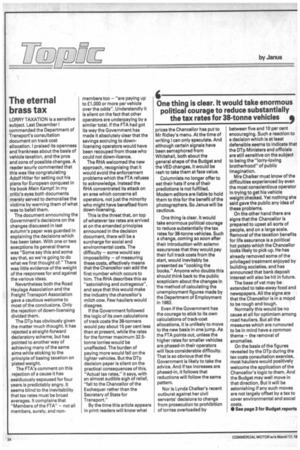The eternal brass tax
Page 26

If you've noticed an error in this article please click here to report it so we can fix it.
LORRY TAXATION is a sensitive subject. Last December I commended the Department of Transport's consultation document on track cost allocation. I praised its openness and frankness about the basis of vehicle taxation, and the pros and cons of possible changes. A reader sourly commented that this was like congratulating Adolf Hitler for setting out his plans for European conquest in his book Main Kampf. In my critic's eyes both documents merely served to demoralise the victims by warning them of what was to befall them.
The document announcing the Government's decisions on the changes discussed in last autumn's paper was guarded in explaining the decisions which has been taken. With one or two execptions its general theme was "Some say this and some say that, so we're going to do what we first thought of." There was little evidence of the weight of the responses for and against the various ideas.
Nevertheless both the Road Haulage Association and the Freight Transport Association gave a cautious welcome to most of the conclusions. Only the rejection of down-licensing divided them.
The DTp has obviously given the matter much thought. It has rejected a straight-forward declaratory scheme, but has pointed to another way of achieving many of the same aims while sticking to the principle of basing taxation on plated weight.
The FTA's comment on this rejection of a cause it has assiduously espoused for four years is predictably angry. It seems blind to the inevitability that tax rates must be broad averages. It complains that "Members of the FTA" — not all members, surely, and non members too — "are paying up to £1,000 or more per vehicle over the odds". Understandly it is silent on the fact that other operators are underpaying by a similar total. If the FTA had got its way the Government has made it absolutely clear that the savings accruing to downlicensing operators would have been recouped from those who could not down-licence.
The RHA welcomed the new approach, recognising that it would avoid the enforcement problems which the FTA refuses to acknowledge. Instead the RHA concentrated its attack on an area which concerns all operators, not just the minority who might have benefited from down-licensing.
This is the threat that, on top of whatever tax rates are arrived at on the amended principles announced in the decision document, there will be a surcharge for social and environmental costs. The difficulty — some would say impossibility — of measuring these costs, effectively means that the Chancellor can add the first number which occurs to him. The RHA describes this as "astonishing and outrageous", and says that this would make the industry the chancellor's milch cow. Few hauliers would disagree.
If the Government followed the logic of its own calculations of track costs the 38-tonners would pay about 15 per cent less than at present, while the rates for the former maximum 32.5tonne lorries would be unaffected. The burden of paying more would fall on the lighter vehicles. But the DTp decision paper is silent on the practical consequences of this. "Actual tax rates," it says, with an almost audible sigh of relief, "fall to the Chancellor of the Exchequer rather than the Secretary of State for Transport."
By the time this article appears in print readers will know what
















































































































